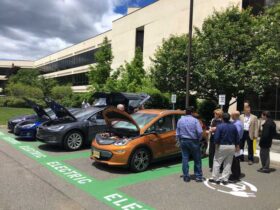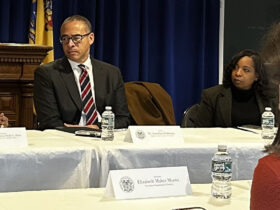 Amid the global COVID-19 pandemic, the presidential primaries and election have stirred controversy. Some argue that election booths will result in a dangerous spike of coronavirus cases within the United States, while some argue that the outbreak is not as serious as the media has portrayed it to be. States have begun to take action by implementing remote voting during their primaries. Here’s a guide on mail-in voting as well as analysis of what the frontrunners of each party have to say about this situation.
Amid the global COVID-19 pandemic, the presidential primaries and election have stirred controversy. Some argue that election booths will result in a dangerous spike of coronavirus cases within the United States, while some argue that the outbreak is not as serious as the media has portrayed it to be. States have begun to take action by implementing remote voting during their primaries. Here’s a guide on mail-in voting as well as analysis of what the frontrunners of each party have to say about this situation.
The Pros
-
Convenience and Turnout – Because there is no need to go to a physical poll site and potentially wait for hours in line, mail-in voting may increase voter participation. It would be more convenient for those to fill out a ballot in the comfort of their own home, making it probable that more people will cast a vote on Election Day. While it may be too early to tell whether or not mail-in voting will directly lead to higher voter participation, results in past elections indicate this possibility. In the 2018 primaries, for instance, voter turnout in states with mail-in voting outperformed states with traditional poll-based voting by 15.5 percentage points. In a 2017 study, researchers found that the overall voter turnout in Colorado increased by 3.3% after a mail-in voting system was implemented in 2014. Perhaps this new system will incentivize those to cast a vote, as it will provide potential voters a path of less resistance.
-
Safety – Of course in current times, mail-in voting is a safer alternative to in-person voting. In a recent survey, more than 50% of Americans showed their support for mail-in voting given that the pandemic persists. The global outbreak has caused some citizens to choose between their democratic power and health, but mail-in voting is an effective route that states can take to protect their people. The Centers for Disease Control and Prevention recommends a distance of at least six feet apart from other people who are not in your household in outdoor and indoor conditions. This ensures that droplets and germs that may cause COVID-19 launched into the air will not land on someone else. In-person voting leads to physical contact, which will likely result in the spread of germs. In fact, on April 7th, Wisconsin held in-person primaries, which resulted in a spike of coronavirus cases, despite social distancing and preventative measures in place. Simply put, even with masks, social-distancing, and other health protocols, physical election booths pose too high of a risk of contracting and spreading the coronavirus. With mail-in voting, people will not come in contact with others, which protects public health.
The Cons
-
Security – Widespread mail-in voting may be a dangerous new system for our country. First off, the act of voting will become less private. In other words, voters may live in a household where family members or loved ones can influence who they choose on the election ballot. People may find it more difficult to stand up for their beliefs and make a truly independent choice in the context of home with loved ones trying to persuade them. Specifically, at a physical election booth, voters are separate from any other person other than themselves. However, at home, familial influence is present even with the ballot directly in front of the voters. Furthermore, ballots are in the hands of the post office and mail carriers, meaning that they could be lost or thrown out without voters knowing. Some argue that the risk and possibilities of fraud are too high to participate in mail-in voting. In fact, in the Special Elections in Paterson, New Jersey, 19% of ballots were determined fraud. However, voters must understand that vote-by-mail fraud has been a topic of controversy lately, and politicians and government officials seem certain that each ballot will be handled with the utmost care and responsibility. Especially more recently, in most areas, rates of past voter fraud are extremely low.
-
Time Delays – With widespread mail-in voting, delays are inevitable. This past year, California counted votes for over a month due to a large number of mail-in votes. With the time needed to collect every ballot and record each vote, results may be delayed for days and weeks on end. Past elections have revealed the difficulty in counting mail-in votes without delay, so it is reasonable to believe that the presidential election will endure time obstacles. Especially in a presidential election, these time delays create a wave of uncertainty in our country. Even a delay of just a couple of days or weeks raises a countless number of questions, including who will run our country and whether or not Trump will stay in office for a few more weeks.
What do Trump and Biden have to say?
Current president and Republican front runner Donald Trump has conveyed his disapproval with mail-in voting. Through his Twitter account, he expressed that mail-in voting has led to fraud in the past, referring to the New Jersey scandal, and could result in cheating.
Instead, Trump has shown support for absentee voting, which occurs when a voter qualifies for remote voting only by meeting certain criteria. This would significantly lower the number of people utilizing the mail-in voting process. Trump also stated that in-person voting is a way to “proudly” display one’s patriotism, and showing up with voter identification to an election poll is “the real deal”. On the other hand, Democratic candidate Joe Biden has stated that mail-in voting is necessary in times such as these in order to ensure public health. He linked mail-in voting to higher voter participation, stating that it is an “easier way to vote.” Biden has also mentioned Trump’s hypocrisy, as the current president has written in mail-in votes in the past.
Election Day is arguably one of the most significant days for our nation. Thus, mail-in voting is understandably a frightening new system for some people, especially considering its negatives. Nevertheless, in a time when a deadly pandemic has been plaguing our nation, mail-in voting is a viable option for those who wish to exercise their democratic right while staying safe and healthy. As a whole, our country may need to overlook the disadvantages to ensure a somewhat smooth election without risking lives.














